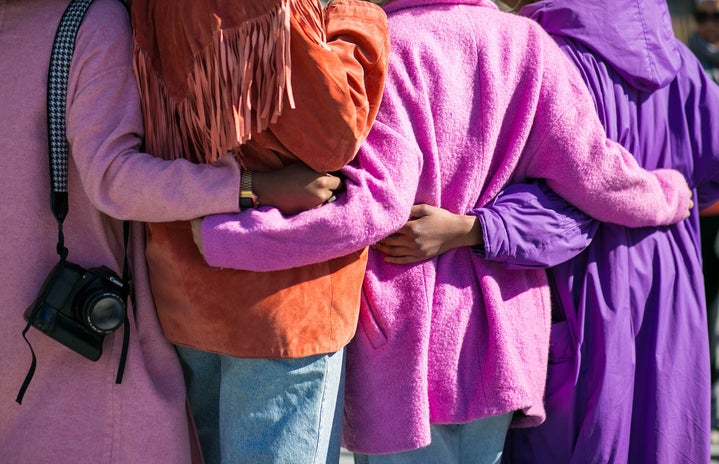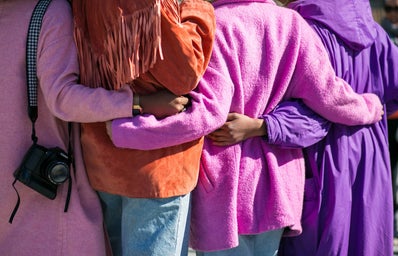Man’s best friend might be a dog, but woman’s best friend is a woman
Anyone who knows me knows that I love my girlfriends. They’re effortlessly funny, insanely smart, and endlessly supportive. Whether it’s something as little as sending me a song that reminded them of me or something as huge as supporting me through heartbreak, I have never doubted that my female friends have my back. I’m not alone in this feeling, either. In a 2020 study by Robin Dunbar, 85% of 201 females reported having a same-sex best friend. What are the reasons for this phenomenon?
The Difference in Friendships Between Women
For the purposes of this article, friendships between women will be directly compared to friendships between men. However, it’s essential to acknowledge that there are plenty of meaningful and fulfilling friendships between all genders.
Friendships between women are unique in that they focus heavily on communication and individual connections when compared to friendships between men. Dunbar’s study demonstrates that the dynamics of male friendships and female friendships differ drastically. While all friendships are more intimate when individuals are more similar to one other, women’s friendships emphasize shared humor, education, and happiness. Men’s friendships emphasize shared activities, social connections, and financial positions. This indicates that male friendships are dependent on social context, whereas female friendships are dependent on individual connections.
A study from the University of California, Los Angeles, found that when women experience stress or isolation from others, they have higher levels of oxytocin, the love hormone. This encourages women to reach out to their social circles in times of crisis, which strengthens bonds. I know that the second I receive bad news or suffer an inconvenience, I’m texting my best friends immediately. Think about how you vent to your girlfriends when you’re stressed – that’s biology at work.
A Community of Connection
Friendships between women also foster transparency that’s difficult when befriending men. Women tend to share intimate details of their lives with each other. This enables women to become unparalleled sources of comfort and support during hardships. For example, imagine that a woman is in the middle of an intense argument with her mother; her mom doesn’t like that she goes out late, and the woman is wondering how she should handle this situation. If the woman confided in a male friend, he might start to give her advice immediately. He might not know how to engage with the woman’s emotions.
Women are so open with each other, because they feel less likely to be judged by their female friends. We tend to not hesitate to speak about personal issues the way we would with people that we don’t think will understand. For example, I vent to my girlfriends nonstop about my menstrual cycle, but I don’t share that information with my guy friends. It’s a natural function, but I’m afraid that men won’t understand or know how to respond, because they don’t experience periods. Most women have experienced frustrations related to their gender; these experiences are easier to share with other women because we know that they get it. For example, my friends in STEM majors constantly talk to me about the sexism they experience from their male peers. It’s easier for them to talk to me about this information than it would be for them to talk to a guy, because a man might not understand why such experiences are disheartening or frustrating.
Benefits of Female Friendships
Any friendship enriches our lives, but female friendships may especially create solidarity which is essential to well-being. Female friends help mitigate feelings of loneliness, because they combat the perception that you’re alone. Even a simple text to a girlfriend about something you’re going through can help ward off isolation. In an increasingly global and technological world, it’s easier to keep in touch with our friends, so we should use this to our advantage.
Technology helps us maintain female friendships. I’ve been best friends with the same person for nearly 7 years; technology has been the main tool that we’ve used to keep in touch and support each other through COVID-19 and college. The effort that women expend in order to prolong their friendships ultimately pays off. A longitudinal study of female friendships during and after college showed that female friendships that thrived in college and adulthood can have an enduring impact on cognitive development. Friendships between women maintained in adulthood improve emotional intelligence, problem-solving, and empowerment. Female friendships in the workforce can improve salary and encourage women to speak up about their ideas and frustrations at work. Clearly, female friendships are incredibly beneficial.
To be clear, similarities in friendships usually strengthen them across within all gender identities. For example, a study of transgender and sexual minorities showed that friendships with others of their gender identity created communities, comfort, and understanding, which improved their quality of life. These effects also vary between individuals as the experiences of transgender folks and other sexual minorities are diverse. In general, shared experiences mitigate feelings of loneliness and isolation.
The strength of female friendships doesn’t deny that basic components of good friendships – like empathy, patience, and support – are all still necessary for your friendship with a woman to succeed. Women might just be more capable of providing this for each other than their male counterparts.
The bottom line is this: female friendships are incredibly important. So, if you haven’t reached out to your gal pals in a while, do yourself a favor and schedule something. Whether it be a dinner at Chili’s or a movie night, trust me when I say it’s worth it.


